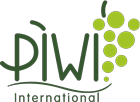April 13, 2022
Germany demands 30 percent organic viticulture, 25 percent organic viticulture demands the EU - Is that realistic with the current circumstances, or as DWV Vice President Thomas roll as moderator the panel discussion in the frame the meeting »Future.Viticulture.Danube Region: Future of Organic Viticulture – Opportunities and Risks« formulated: "Have weather the right tool box, around the organic viticulture future proof to do?" One exciting question, With the itself the profession, which politics and science deal with intensively.
Due to climate change, viticulture in Europe is increasingly associated with extremes weather events and stable weather conditions over a long period of time. the Consequences are, among other things, long phases of long-lasting moisture. This last year led to severe downy mildew infections, some of which were extreme Yield losses in numerous wine-growing regions in Central and Southern Europe. "That Interest in the profession is basically very large, on ecological management to switch Simultaneously become the risks of profitability due to the limited options for action due to the difficult framework conditions with regard to the use of pesticides," says DWV Vice President
roll. "It must be our goal to bring organic viticulture to the area, as it is from demanded by the EU Commission.«
After the presentation of the prospects for organic viticulture by the EU Commission and presentations the situation of organic viticulture in different DWV Vice-President Thomas Walz discussed with representatives of the countries bordering the Danube of the profession (Jan Plagge, President of Bioland and IOFAM Europe as well as Milan Hluchy, president Ekovin Czech Republic), of federal ministry For Agriculture (head of department Dr. Burkhard Schmied), science (councillor French Rosner from the federal office For Wine- and orchard) such as With the EUMembers of Parliament Christine Schneider and Simone Schmiedtbauer from Austria. unity duration, that the large-scale planting from new, grape varieties that are more resistant to fungi is part of a medium and long-term strategy. However, sufficient planting material must be available for this. Furthermore, the outlets to help develop. to consider is also, that one Conversion of grape varieties takes 30 to 40 years.
In front this background demands the profession one sensible Addition the Options for action in organic viticulture in plant protection. This could be through a Limited and time-limited approval or approval linked to climatic conditions of phosphonates in organic viticulture. At the same time, this contributes to Copper optimization and minimization. Forecast models are also further developed to enhance. Soil and plant protection, as well as economic and ecological ones Sustainability for companies and the environment must be reconciled.
MEP Christine Schneider addressed the individual concern of many companies as well the implications for the industry as a whole. »Without adjusting the »toolbox« I see the danger that we will lose numerous organic farms. A long term The solution lies in vine breeding and the further development of PIWIS. In the short term, however, we have to expand the possibilities in crop protection again!«
MEP Simone blacksmith farmer praised the unity and unity the Producers: »The challenges for all producers Producers are big. Organic wine production should be noticeable in the next few years increase. I am pleased that the winegrowers are willing to accept this to go towards more sustainability. Now it is up to the EU Commission and the Member States to create the necessary framework conditions and in doing so above all, not to ignore the economic component. «DWV President Klaus Schneider was satisfied in his final statement: "Of the organic viticulture is because of the sustainability strategy the EU from higher Significance in all countries bordering the Danube. Contrary to the political will, the Number of new organic farms not fast enough. There are good reasons for this and we
are glad that we managed to pass a corresponding final resolution write, in which, among other things, winegrowing associations from Germany, Austria, Czech Republic and Hungary such as organic associations how Ecovin Germany, Ekovin Czech Republic, Bioland and PIWI International participate. Well we must with this Approach politicians with a resolution.« President Schneider's thanks go in particular also Minister of Agriculture Hauk, who spoke at an event with the EU Commission End last year clear For the reintroduction from Potassium phosphonate had used: »Such a broad unity of the producers for securing the future of organic viticulture is unparalleled in Europe!«
DWV General Secretary Christian Schwörer is also pleased: "It's with this one Project succeeded, the common with the Central and Eastern European countries cooperation to intensify and to further develop.« The from the Ministry of State Baden-Wuerttemberg sponsored Project
»Viticulture.Future.Danube region – Effects of climate change on viticulture« started in 2018. This intensive exchange should continue even after the project has been completed to be continued. The DWV would like to continue to function as a platform here.
2022-04-13_DWV-Kongress_Weinbau-Zukunft.Donauraum_Future-of-organic-wine-growing-chances-and-risks

